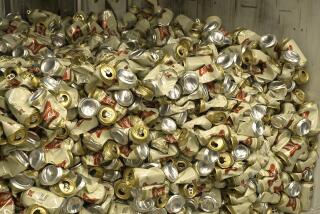Latest victim of U.S.-Russia tensions may be Kentucky bourbon
- Share via
Reporting from Moscow — Let them drink vodka.
Perhaps that isn’t exactly the message Russia is trying to send, but it appeared Monday as though Kentucky Gentleman bourbon was about to become the latest casualty of the tensions between Russia and the West.
The Russian consumer protection agency, Rospotrebnadzor, was preparing to add Kentucky Gentleman to a growing list of imports banned since the West stepped up sanctions to punish the Kremlin for its policies in Ukraine.
The agency said it had found (link in Russian) traces of toxic chemicals in Kentucky Gentleman, a relatively inexpensive brand produced by the Barton Brands distillery in Bardstown, Ky. The presence of phthalates, a type of solvent, in the liquor could pose a threat to imbibers’ nervous and endocrine systems, cause cancers and reduce fertility, according to a statement posted on Rospotrebnadzor’s website on Monday.
Rospotrebnadzor also raised questions about the customs documents submitted by importers of Kentucky Gentleman, saying they did not comply with the “technical regulations” of the Moscow-led Customs Union, an economic grouping between Russia, Kazakhstan and Belarus.
An investigation of possible violations was getting underway.
Amy Preske, a spokeswoman for Sazerac, the parent company of Barton Brands, said the company had not been contacted by Rospotrebnadzor and had no immediate comment on the agency’s claims.
The U.S. Centers for Disease Control and Prevention say the effect of low-level exposure to phthalates is unknown, although the chemicals have been shown to affect the reproductive systems of laboratory animals.
Russia’s health and safety regulators have gone into overdrive since the United States and the European Union stepped up sanctions late last month in an attempt to coerce the Kremlin to stop backing pro-Russia separatists in Ukraine.
Though earlier Western sanctions imposed after Russia annexed Ukraine’s Crimea in March mainly targeted individuals deemed to be close to President Vladimir Putin, the new punitive measures are much tougher and are aimed at the heart of Russia’s economy, including the financial, oil and defense industries.
In a move that Western commentators described as retaliatory, Russian health and safety watchdogs warned last week that it might ban U.S. poultry and European fruit on health grounds and was investigating cheese supplied to the McDonald’s hamburger chain for traces of antibiotics.
Russia placed a sweeping ban on imports of fruit and vegetables from Poland last week, claiming the produce contained unacceptable levels of pesticides. Poland, a staunch supporter of Ukraine’s new pro-European government, contended that the restrictions were political.
Such trade wars have a long history. In 1996, Russia famously banned U.S. chicken -- known as “Bush legs,” for then-President George H. W. Bush -- after claiming it did not meet Russian health and safety standards. The ban was later lifted.
Rospotrebnadzor said on Monday that the investigation of Kentucky Gentleman would target only that brand and not extend to other U.S. bourbons.
Although vodka is, by tradition, Russia’s favorite alcoholic beverage, consumer tastes have begun to change since the Soviet Union collapsed and the market opened up to foreign products. Quaffing imported Scottish and Irish whiskeys or U.S. bourbon is now seen as a fashionable alternative to vodka and a mark of sophistication.
Gorst is a special correspondent
More to Read
Sign up for Essential California
The most important California stories and recommendations in your inbox every morning.
You may occasionally receive promotional content from the Los Angeles Times.










